Plumtree - Interview
by Mark Rowland
published: 6 / 9 / 2010
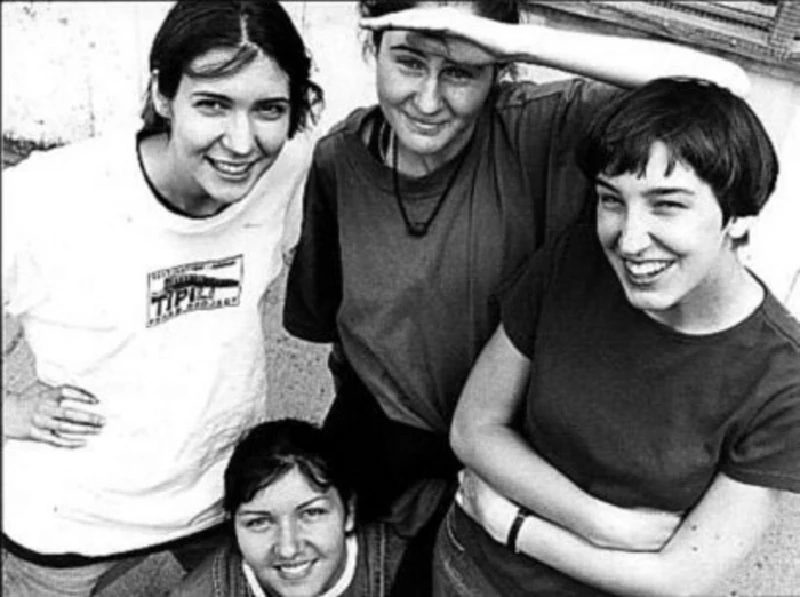
intro
Catriona Sturton, the bassist with the now disbanded Canadian indie group Plumtree, chats to Mark Rowland about the renewed interest in her group after it provided the inspiration for the 'Scott Pilgrim' comic books and film
Plumtree recently got their official website set up. They’re also on Twitter. It’s been a decade since they broke up. The band always had a decent following in their home country of Canada, but over the past decade their fanbase has expanded across the globe. There are several reasons for this. One is the exposure the internet can provide bands of all areas. Another is the increased attention awarded to the Canadian music scene from the UK and American press. The other is 'Scott Pilgrim' – the comic book series and recent big budget film, with a title and principle character named after one of Plumtree’s singles, taken from their second album, ‘Predicts the Future’. The writer of 'Scott Pilgrim', Bryan Lee O’Malley, named his character in tribute to the band. Now that the series has been made into a film, with Plumtree songs on the soundtrack, interest in the band has increased dramatically. Formed in 1992, the band released three albums and countless singles over the course of eight years, before splitting up amicably in 2000. The band came together in high school, with Carla and Lynette Gillis on vocals and guitar and drums respectively, Amanda Braden on guitar and Nina Martin on bass. After release of the distinctively lo fi ‘Mass Teen Fainting’, Martin left the band to focus on her degree. She was replaced by Catriona Sturton; a harmonica player who had never played bass before joining Plumtree. Their second album ‘Predicts the Future’ won the band greater acclaim and displayed a leap forward in the band’s songwriting. Featuring the song ‘Scott Pilgrim’, it’s currently the group’s most popular album. The band’s third and final album, ‘This Day Won’t Last At All’ was another leap forward in terms of songwriting, with a more mature and diverse sound. The band split soon afterwards, though all the members remained friends. Since the split, Burden is completing a PhD in Boston. Carla and Lynette Gillis play in several bands, and their project SISTER has just released an EP. Sturton has played in several bands since leaving Plumtree, playing guitar and singing for the first time, played harmonica with several bands and artists, and has learned an assortment of instruments, including the Shamisen, a traditional Japanese instrument which she learned while living in Japan. She is currently working on her solo album with Rolf Klausener, the frontman of the Acorn. Sturton spoke to us about the band’s history, and the members’ current projects. PB: What was the thinking in releasing a retrospective compilation this year? CS: It was mainly because of interest in the film and the fact that we probably underestimated the interest it would generate in the band. We had some CDs that we’d been selling and they had sold out, or they had been getting closer to being sold out more than we expected. We considered repressing those, but I think at the same time we thought for the people who owned the CDs it would be cool for them to have something new, so we decided to make a new version. PB: What sort of things have you included on the compilation – is it rare stuff, singles, album tracks? CS: There’s a few rare ones, some early things, and then there’s a mix from all of our CDs. We um, I guess on our Facebook page, or just in general, we asked people who liked the band what songs they’d like to hear on it, and we sort of incorporated that feedback, and we picked the ones we like. PB: It seems that the internet has played a big part in building an international following for the band. Do you think that’s fair? CS: I think if we’d have been a band later we would’ve been more of an internet band to begin with. It’s kind of funny, because for an independent band we did quite a lot. We toured Canada nationally many times, we did a lot of tours of Ontario, so while we were a band, lots of people were writing on the zines and there were little newspaper articles, stuff like that. We were talking about it later and it was funny that there weren’t… it seems like people found out about music in a different kind of way then, and then we broke up and we didn’t really have a web presence. For example, we never had a band website – there were some fan sites, but we had never done anything like that. In recent years, I guess it’s hard to separate the interest generated through the comic and people finding out about us through other things. The first comic, I think, came out in 2004, and we’ve heard from people that are fans of the comics and it’s been neat as that’s grown. Carla and Lynette were in a band called Bontempi, which started not too long after Plumtree broke up, and they were also in the band Bells Clanging, and now their new band SISTER, so they had been playing shows – not touring as much, but playing shows. I was in a band in Japan called the Secret, and we came to Canada and toured here and got some press for that. So I guess people found out about us over time through different people, but definitely with the movie, it’s really changed the number and scope and international reach of people who are getting in touch with us. It’s been really fun; we’re really appreciative. PB: What was you first thought when you heard that Bryan Lee O’Malley had names a comic book after your song? CS: My first reaction was that it was really cool, and I think I noticed particularly when first reading the book, you know, "oh, Scott Pilgrim! That’s really funny!" But I have to say that even by the time I’d finished the first book, and definitely in to the next few volumes, for me, it just became more about me being a fan of the book; I just wanted to know what was going to happen next. For all of us, I think it was really flattering. Now all of us have become friends with Bryan, so we’re happy and proud of him, and excited. But I think for all of us initially, it was really flattering. PB: The Canadian music scene has a lot more of an international presence that it had before. CS: My friend and I were talking the other day about how happy we were to be part of the Canadian music scene. I don’t know if you’ve heard of the band the Acorn? Rolf [Klausener] is my roommate, actually. They’re great. We were just talking about how, I think because Canada’s a pretty small country – not a small country geographically, but population wise – you get to know people pretty quick. It’s funny that with people who are like your complete musical heroes, it doesn’t take very long before you just know them, because it’s a small country. There’s a lot of good things about Canadian music. I think, even in the years after Plumtree broke up, there started to be more of an emphasis on bands from Canada, but we had already finished by then. We did actually put out a 7” in England, I think. Now I keep wondering what happened with it, I don’t know how to contact the people who had put it out. It was a little label called Mustard Records, and they put out a three-song 7”, I think that’s the only thing that we put out in the UK. PB: Will the new compilation be coming out in the UK? CS: The digital version of the best of will get released, but we would really like to put the CD out in the UK too, but we’re sort of figuring out what would be the best way to do that. PB: I’ve just found a reference to that 7”. Is it ‘Preserving Wildlife’? CS: Yeah. I think we came up with that title. There was a bar in Ottawa, like a cheesy meat market. I can’t remember the name of the bar, but their tagline was ‘preserving wildlife’, and for some reason, we just thought that was hilarious. So we made it the title of the 7”. It’s a funny thing about Plumtree – we would have small runs of our early stuff, and we wouldn’t even keep them, we’d sell them all, we wanted to make sure that as many people had them as possible, so among the four of us, we don’t actually have a lot of our records. I don’t know if any of us have a copy of that. Actually, with that one, I think we might, because for us it was exciting that it was released in the UK. But with a lot of the other stuff, we own them. PB: So how did that UK record come about? CS: The fellows from Mustard, I think they were on holiday in Canada, and they got one of our records, or CDs or cassettes, even. They got in touch with us and I think it was one of their first releases that they put out. I don’t know if they put out that many records. PB: Judging by the release date, that must have been one of the first releases you played on? CS: It pretty much was songs from the CD, which is the first thing that I recorded with them. It’s a little bit of a funny thing. ‘Scott Pilgrim’ – the song ‘Scott Pilgrim’ – was the first song that I ever wrote with Plumtree. Carla wrote the guitar and Carla and Amanda wrote the words, but it was the first bass part that I’d ever written. It makes me think that I’m a fairly lucky person. PB: So how did you end up joining Plumtree, considering you were a harmonica player that had never played bass before? CS: I went to school with Amanda, and we were in the same class in our first year of university. I heard they were looking for a bass player, and I’d never played bass before, but over the Christmas holidays I’d gotten a cassette of the songs, and I went home and sort of picked it up. Someone had lent me a bass guitar and it was signed by Geddy Lee from Rush. It had plexi-glass over his signature so that nothing could ever happen to it. That was the bass that I learned the first Plumtree songs on. Then I went back. I’m usually good at picking up stuff. It takes a bit of time after that to actually get good at the instrument. But it wasn’t long after that that we went on our first tour. PB: How did the band get together in the first place? CS: Carla and Lynette started playing in bands together when they were 11 and 13. Plumtree started when Lynette was 14. They had already been a band for a few years before I joined the band. I think they’d been playing for two years when I joined, then I was a member of the band for five years. PB: Had you ever toured before you joined Plumtree? CS: No I had never toured before. I liked touring and the first time we did a Canadian tour, I did find it kind of intense, because it’s a very big country and it takes some getting used to. It’s the schedule of touring Canada. None of us can believe how we did it, but with our first tour we weren’t making a lot of money. We used to give ourselves a little per diem, which was $5 a day for food. That’s what we tried to live off of, just $5. Just getting used to touring from that perspective was tough. But at the same time, it was so much fun. We always toured with bands that we loved; we went on tour with Thrush Hermit a number of times, and I don’t know if you’ve heard of Joel Plaskett? That was his previous band. There was a band called The Local Rabbits, they were really amazing, and the Weakerthans, so once I got used to it, I really liked touring a lot. PB: I read somewhere that you had a very collaborative approach to songwriting. Could you explain a bit more about how you went about writing songs? CS: I think Plumtree’s writing, I think the idea was to have songs that sounded simple, like they were easily put together, but we actually spent a lot of time on them. We were very detail oriented when it came to songwriting. We were pretty slow because we took a lot of time, and originally, the musical style of all the members was really different, so it was a process of coming up with a musical style that fit everyone. Carla and Lynette had come from a pretty heavy metal background, or just enjoying like progressive, skilled stuff, and Amanda was really into pop and indie, and Nina too, who was the first bass player. For me, one of the things I really loved about Plumtree was Lynette’s drumming; she always came up with really interesting things, and we spent a lot of time working on drum parts that were a bit different. She was a lot of fun to play with as a drummer. So we were slow to write, but I think, in some ways, out of all the things we did – writing was a lot of fun, but we liked playing live. As far as recording, too I always felt that Plumtree was quite detail focused, trying to find the perfect sounds for things – not that I’m like that so much, but as a group we were. Then with later songs, after a while, because it would take us so long to write songs and coming up with different parts and trying to find ways in which they would go together, in later albums, it was just asking someone to finish an idea and bring it in, rather than having one idea, and everyone working on it, just to try and speed things up. PB: It seems like ‘Predicts the Future’ was a bit of a leap forward in terms of critical acclaim and exposure. Is that how it felt at the time? CS: I don’t know; Plumtree always right off the bat had some pretty lucky and great opportunities. I think ‘Predicts the Future’ might have been the first national touring that we did in Canada, so that could be part of it. I’m not going to say it’s because I joined the band Llaughs). It wouldn’t be true! Maybe it’s the benefit of being around a bit longer, I’m not sure. I know a lot of people who have that album as their favourite album. PB: It definitely seems like each album was a step forward in terms of production. How did your approach change as the years went on? CS: We sort of had a chance to compare when we did the best of, because we had to get all these different songs from different albums mastered onto the one album. I think in some ways, the recording that we did on the last album is something that we’re really, really proud of. It wasn’t recorded in a typical fashion, though that was fairly intentional. I think that 'Predicts the Future' is actually more produced in certain ways. I really like all the CDs, including the one that I didn’t play on. I like it a lot. PB: Were you as collaborative lyrically as you were musically? CS: It was Carla and Amanda, and generally the parts that Amanda would sing were what she had written and the parts that Carla would sing would be her words. Lynette also sings, more on the earlier songs. It’s great to see that with SISTER, Lynette’s doing a lot more singing and songwriting, which is really cool. I wrote one song on the last album, ‘My My’. PB: Did you sing on that track? CS: I didn’t sing on it. I wasn’t a very experienced singer at that point, so. PB: Moving on to your videos – a lot of them have a very similar, sort of homemade look to them. Was that deliberate, or the result of tight budgets? CS: I think at the time we all thought it was high technology. With some of them, we got grants to make them. I don’t know if there was an aesthetic at the time, for mid-to-late-nineties Canadian music videos. It’s funny. Even watching something like ‘Pretty Woman’, which was on TV the other day; it’s funny that a film that was around when I was a kid kind of looks like an old movie now, especially compared to newer stuff. I guess one of the things about all our videos is that all except for one were made on a very small budget, with lots of favours for friends. Our last video that we made, for ‘Regret’, I think that we made it for $1,000, maybe? Around that. PB: Really? That looks like the video with the highest budget. CS: The one that we made previously, which we’d gotten a grant for and cost $20,000 doesn’t look as slick as that one. We were also learning, I think. It’s funny that 'Scott Pilgrim' is the video that gets played the most right now, because that was the first video we made, and we didn’t know as much. But we were very lucky. Our manager, Walter Forsyth, directed all our videos for us. If it wasn’t for him, I don’t think we’d have made as many videos. PB: I particularly enjoyed the video you did for ‘Go’, in the theme park. CS: I can tell you an amusing ‘Pop-up Video’ anecdote from that. There’s a scene where Lynette gets thrown off the tilt-a-whirl, and we’d forgotten to get a dummy until the night before. So on the night before, when we were sitting around, thinking about what we were going to do about this dummy – it was a Friday night. Someone remembered that there were dolls at the adult video store, so we bought a very cheap one and put a wig on it for it to be Lynette. Which is why on our website, there’s a very creepy picture of Amanda and the doll. It was for wholesome purposes, so it was ok. PB: Well, at least it worked. CS: I think that’s what Lynette was worried about, that it seemed to work very well. PB: You do seem to have a lot of videos where you’re all running around and messing about outdoors. CS: I think with the later videos, we realised we didn’t want to keep staying outside and freezing all the time, making them. Also, near the end, we started thinking about, you know, we’d never given much thought to make up or anything like that, and towards the end we started thinking; maybe won’t want to look so…unposh. PB: Your last album, ‘This Day Won’t Last at All’, is great, but it has a different feel to it than the previous albums. What had changed? CS: Like I said, we wanted to have someone start and finish a song before we started working on it. We were all a little older, so we were starting to go through stuff, not that we hadn’t been through stuff before. There were a lot more songs about break ups and travelling, and even being in a band and being away a lot, and the effect that has on your relationships, I think that came in through the songwriting. We recorded it in a really different way, we were…I really love that album too, I don’t know what would have happened if we’d have made an album after that. But yeah, that album was maybe a little more serious. PB: It wasn’t long after that album that you broke up. From an outsider’s point of view, it seems strange considering you all clearly get on very well. CS: It was actually the sweetest thing about getting together for the premiere [of the film 'Scott Pilgrim']. We haven’t really been able to hang out the four of us all this time, and we really do love each other. It really was great seeing them all again. It was really nice. We were a really serious band, but we had also been in school the whole time we were doing Plumtree, so there were opportunities school-wise. I think it did work out well. For example, Amanda started a master’s after the band broke up, and she’s just finishing her PHD shortly, and we’ve all gone on to do things that we’re all really proud of. It’s just too bad that we’ve all ended up in different places. Now I think it’ll be a while before we’ll be in the same place again, so there probably won’t be any Plumtree reunion. PB: The presence of Plumtree songs on the 'Scott Pilgrim' soundtrack should bring more people to your music. Do you think you might get sick of that song? CS: I was surprised that Bryan still likes to listen to it! One thing that’s really cool is that on the soundtrack, it’s remastered, and it was remastered by Nigel Godrich, and it sounds amazing. He did such a good job. PB: So why did Plumtree break up in the end? CS: It’s funny – when we met up the other week we were asking ourselves; why did we break up? Everyone remembered it differently, and none of us had any clear memories of it. I guess a few things; there was school, and you know, this is going to sound like a really funny answer, but I guess I’m not entirely sure. It wasn’t because we didn’t like each other, and it wasn’t because we didn’t get along and it wasn’t because we didn’t gel musically. I think, because we were all in Halifax, we would’ve had to move together to some other city, and if we had wanted, I think everyone else hadn’t ever had the opportunity to move. I think it was also a shifting time in music. There’s always ebbs and flows, but I think there had been a giant wave for the Halifax scene, which had been popular, and live music in general as well. There was a time when there was a lot of bands and a lot of stuff going on, and that started to wane for a while, and I think, and I’m not saying that she broke up Plumtree, but Britney Spears got big, and boy bands, and all that kind of stuff, and the wave of like, Eric’s Trip, Nirvana, that all started going down a bit, so the climate for touring and playing shows, maybe it started to feel a bit harder. As I say, there’s always ebbs and flows, like times when it gets a bit easier and times when it gets a bit harder. We’d been through a lot of that, but I think we were feeling…I don’t know. There were a variety of reasons, but drama was not part of any of them. PB: You all seem to be very busy these days. You seem to have tried all sorts of things. Do you consider yourself a multi-instrumentalist? CS: I’ve gotten ok at a few of them, but I feel more like lately, I’ve been doing is coming back to ones that I started on. But I definitely hop around a little. PB: So what sort of things have you done since Plumtree broke up? CS: My band in Japan, which also toured Canada, that was the first band where I played guitar and sang. I played harmonica for a number of things, but it’s usually one-off stuff, rather than touring. I’ve sort of gotten more into playing solo stuff in the last few years, and just started a band with a friend of mine. She’s really into blues music too, so we’re kind of a mix of deep blues and cheesy indie pop songs, but I’ve definitely been able to have a variety of musical experiences. It’s hard to make a go of it with just harmonica. You kind of need a band or have other stuff going on. Or be really good. PB: What are you all working on at the moment? CS: I’m recording with Rolf from the Acorn right now, I’m looking to release something in the fall or early winter, I’m playing with a girl called Christine. All of the stuff on my MySpace is kind of old, if I had my timing together it would be updated, but I have a very busy job, so it’s hard to get the balance. I’ve been fortunate to be able to try out so many things. I learnt a lot about traditional Japanese music, I have students, and I’ve also been playing with a Japanese flute player. Carla and Lynette have a new EP as SISTER, which they launched at the same time as the last 'Scott' Pilgrim book, which is really great. They’re really good. PB: It sounds like you’re all very busy. CS: Yeah. I guess we’ve always been busy, even when we were in Plumtree, but it feels like we’re particularly busy now, but full of really, really good things. Luckily, we all really like to work. We’ve been lucky to have some pretty great opportunities. PB: Thank you.
Picture Gallery:-
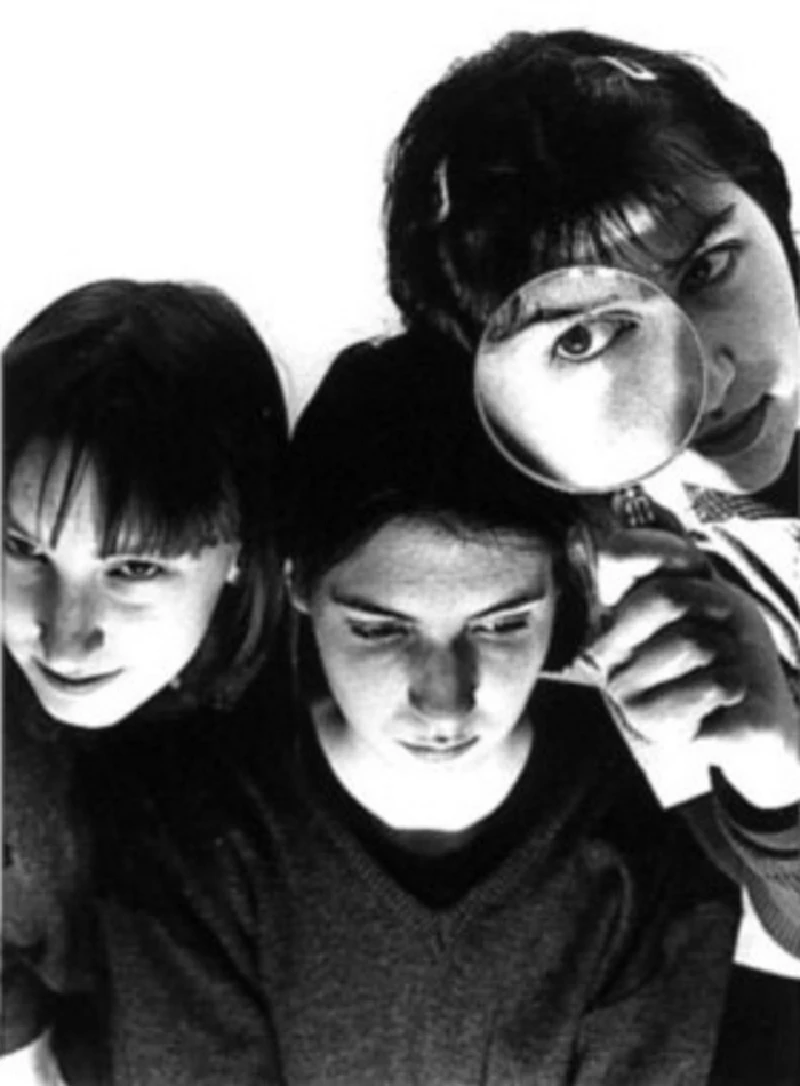
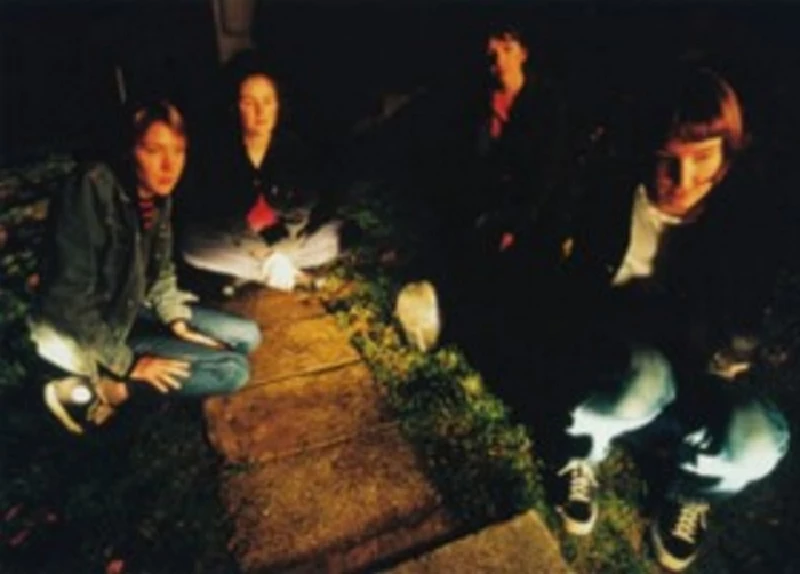
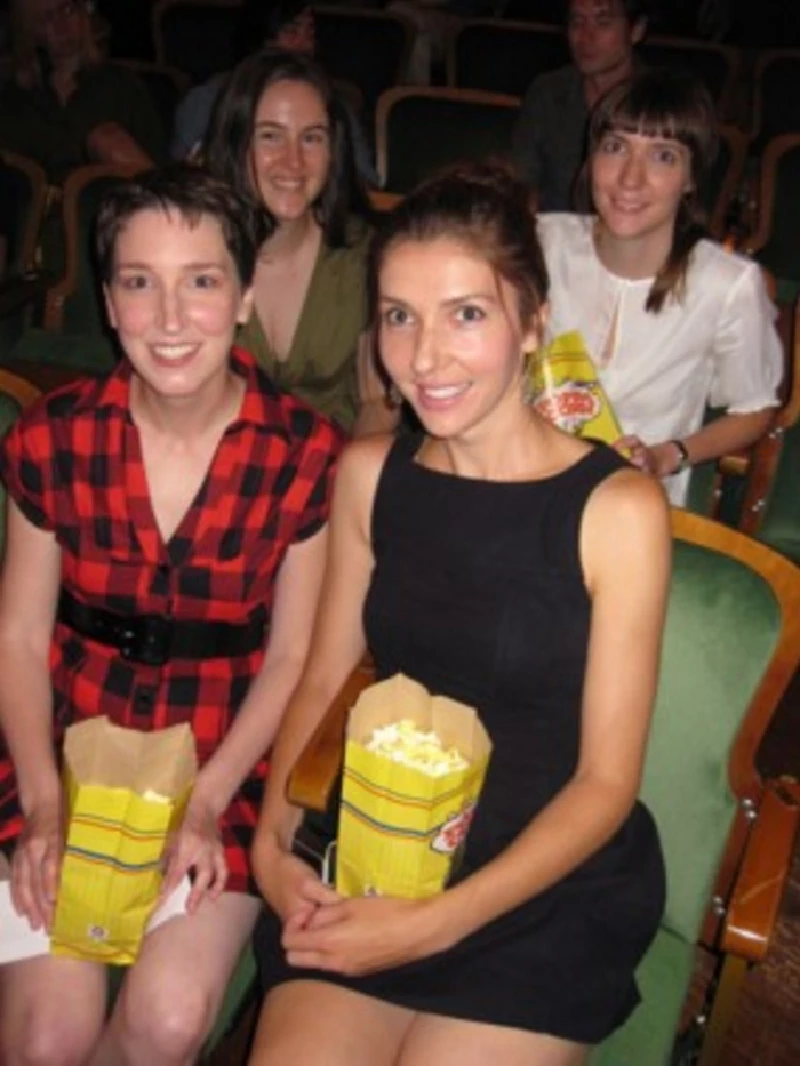
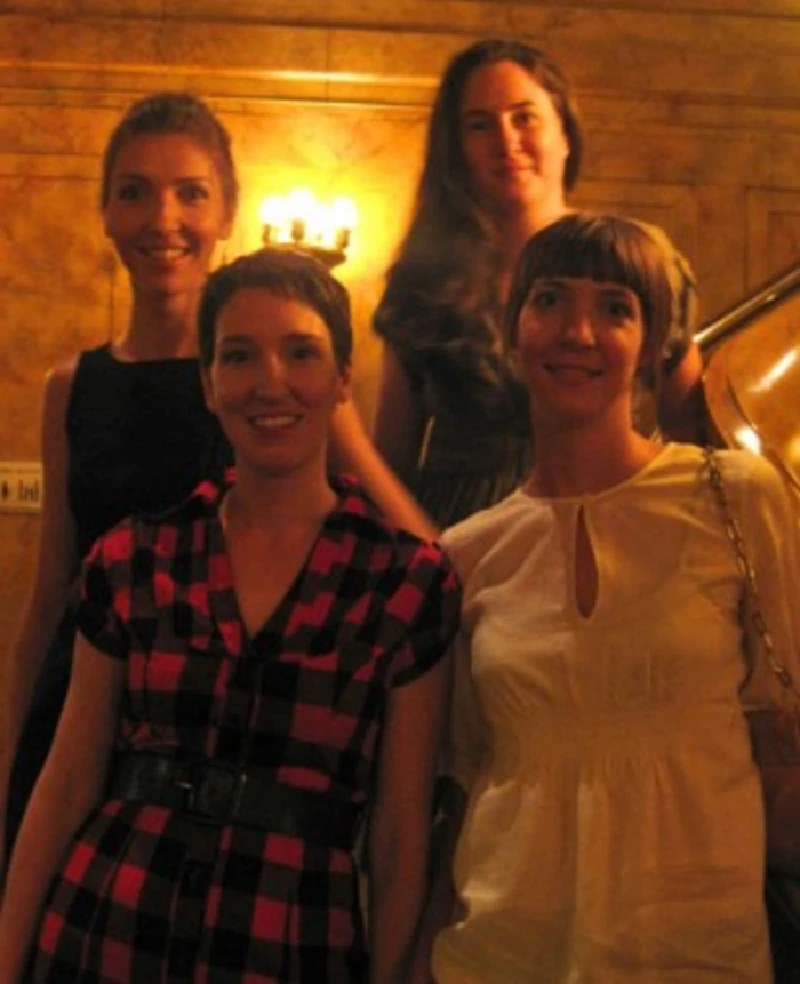
most viewed articles
current edition
Carl Ewens - David Bowie 1964 to 1982 On Track: Every Album, Every SongArmory Show - Interview with Richard Jobson
Colin Blunstone - Thalia Hall, Chicago, 16/7/2025
Visor Fest - Valencia, Spain, 26/9/2025...27/9/2025
Bathers - Photoscapes 1
John McKay - Interview
Loft - Interview
Robert Forster - Interview
Billie Eilish - O2 Arena, London, 10/7/2025
Sir Tim Rice - Interview
previous editions
Heavenly - P.U.N.K. Girl EPManic Street Preachers - (Gig of a Lifetime) Millennium Stadium, Cardiff, December 1999
Beautiful South - Ten Songs That Made Me Love...
Oasis - Oasis, Earl's Court, London, 1995
Pixies - Ten Songs That Made Me Love...
Boomtown Rats - Ten Songs That Made Me Love....
Trudie Myerscough-Harris - Interview
Prolapse - Interview
Peter Perrett - In Dreams Begin Responsibilities Interview Part One
Simon Heavisides - Destiny Stopped Screaming: The Life and Times of Adrian Borland
most viewed reviews
current edition
Amy Macdonald - Is This What You've Been Waiting For?Sick Man of Europe - The Sick Man of Europe
Lucy Spraggan - Other Sides of the Moon
Phew, Erika Kobayashi,, Dieter Moebius - Radium Girls
Davey Woodward - Mumbo in the Jumbo
Alice Cooper - The Revenge of Alice Cooper
Bush - I Beat Loneliness
Suzanne Vega - Flying With Angels
Blueboy - 2
Cynthia Erivo - I Forgive You
Pennyblackmusic Regular Contributors
Adrian Janes
Amanda J. Window
Andrew Twambley
Anthony Dhanendran
Benjamin Howarth
Cila Warncke
Daniel Cressey
Darren Aston
Dastardly
Dave Goodwin
Denzil Watson
Dominic B. Simpson
Eoghan Lyng
Fiona Hutchings
Harry Sherriff
Helen Tipping
Jamie Rowland
John Clarkson
Julie Cruickshank
Kimberly Bright
Lisa Torem
Maarten Schiethart